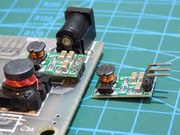Most mass produced home computers hide a lot of complexity in custom chips. This includes the ZX81/TS1000 and the various ZX Spectrum models.
The most complex area is the circuitry to produce a video picture that can be displayed on an ‘ordinary’ television.
If you leave out the video circuitry, and use modern memory chips, you can reduce the chip count and the complexity down rather a lot.
So a basic Z80 based single board computer (SBC) can be made with:
- Z80 CPU
- RAM: A single SRAM memory chip (a 32k x 8 bit type or a 128k x 8 type is recommended such as a 62256 or a )
- ROM: A single 8k x 8 bit EEPROM, or a 32k x 8 bit EPROM chip or anywhere inbetween (examples AT28C64B, AT28C256, 27C256)
- Some kind of input interface circuits/system (buttons, keyboard, RS232 serial)
- Some link of output interface circuits/system (LEDs, LCD text display, RS232 serial)
- Some logic chips to glue all of the above together, to provide a reset signal and a clock signal to the CPU
- A suitable PSU or power supply circuitry
The address bus on such a computer is really rather simple. Address lines A0 to A14 go from the Z80 CPU to the SRAM and the ROM (be it EPROM or EEPROM). Address line A15 is used by the address decoder part of the glue logic to select between the ROM or the RAM.
Some address lines, such as A0 to A7 may also be used by the I/O chips / circuitry.
The data bus lines D0 to D7 go to everything that needs to connect to the data bus.
The order of the actual connections to the SRAM chip doesn’t matter. So it’s okay to connect CPU A0 to the SRAM chips A6 pin for example. As long as all the SRAM’s address pins are uniquely connected. Same goes for the SRAM’s data bus pins. Don’t try this on the ROM chip though.
The I/O circuits and glue logic depend on what the actual requirements are.
Grant has published a design for a simple Z80 based computer
here.
See also the
RC2014 web site.
The
Sinclair ZX World forums have plenty of hardware home brew related posts (mainly related to the ZX80/ZX81/TS1000), so you may want to visit this forum as well.
Mark
